Govt refuses Everest clean-up amid pandemic calm
Kathmandu, April 10
Nepal’s government today rejected calls to use the pandemic lockdown of Mount Everest to stage a clean-up of the world’s highest mountain.
Fluorescent tents, discarded climbing equipment, empty gas canisters and human excrement litter the well-trodden route to the 8,848-metre high summit.
Authorities last month suspended permits for all mountain expeditions over the coronavirus outbreak, forcing the Nepali Army to cancel an ambitious clean-up on six mountains, including Everest.
“It is not possible this season,” Danduraj Ghimire, chief of Nepal’s tourism department told AFP.
Mountaineering organisations say that the coronavirus crisis is a good opportunity to clean-up what is sometimes called the world’s highest garbage dump.
“The government should let a Nepali team just clean the mountain.
Apart from clearing trash, it would give employment to Sherpas who have lost this season’s income,” said Santa Bir Lama, head of the Nepal Mountaineering Association.
Last year, a 14-strong team spent six weeks scouring for litter at the Everest base camp and at Camp 4 — nearly 8,000 metres up. They cleared the mountain of four bodies and over 10 tonnes of plastic bottles, cans and climbing equipment.
But many said it was just a fraction of Everest’s rubbish — with the harder to reach camps still littered with abandoned gear.
Pasang Nuru Sherpa, who was part of last year’s team, said dragging down trash, and especially bodies, was difficult as hopeful climbers were going up.
“With the mountain empty our work would be much easier and faster and we would be able to clear a backlog of trash. There will only be more layers on snow on it next time and work will be harder,” Sherpa said.
Foreign climbers pay at least $30,000 to tackle Everest but locals say they pay little attention to the environmental fallout.
Nepal levies a $4,000 rubbish deposit for each team to be refunded if each climber brings back eight kilos of waste, but only half return with trash.
READ ALSO:
A version of this article appears in e-paper on April 11, 2020 of The Himalayan Times.






